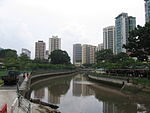National University Hospital

The National University Hospital (NUH) is a tertiary referral hospital and academic medical centre in Singapore, located in Kent Ridge. It is a 1,160-bed tertiary hospital serving more than 670,000 outpatients and 49,000 inpatients and serves as a clinical training centre and research centre for the medical and dental faculties of the National University of Singapore (NUS). NUH is the flagship hospital of the National University Health System and the principal teaching hospital for the NUS Yong Loo Lin School of Medicine. Its campus includes three national speciality centres, namely the National University Cancer Institute, Singapore (NCIS), the National University Heart Centre, Singapore (NUHCS) and the National University Centre for Oral Health, Singapore (NUCOHS).
Excerpt from the Wikipedia article National University Hospital (License: CC BY-SA 3.0, Authors, Images).National University Hospital
Science Park Drive,
Geographical coordinates (GPS) Address External links Nearby Places Show on map
Geographical coordinates (GPS)
| Latitude | Longitude |
|---|---|
| N 1.2950833333333 ° | E 103.78283333333 ° |
Address
National University Hospital
Science Park Drive
118222 , Queenstown
Singapore
Open on Google Maps







